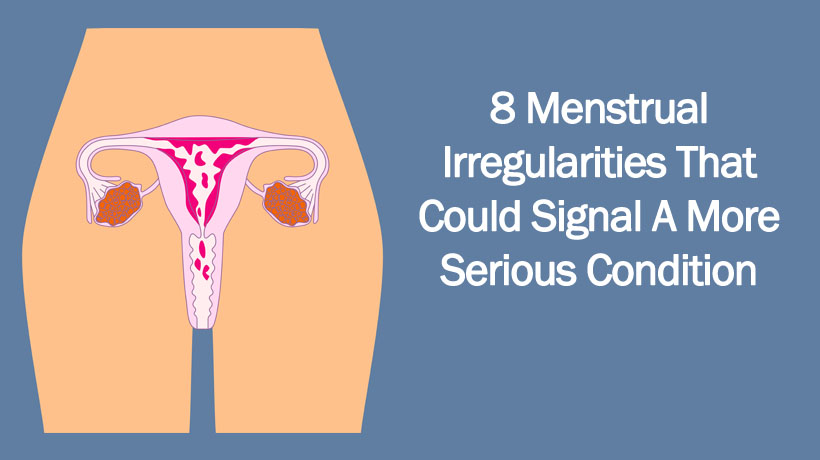More times than not, menstrual irregularities are nothing to worry about. In most instances, simple lifestyle tweaks, such as gaining or losing weight, or toning down the amount you exercise, can solve the problems with your period. But in other cases, there may be an underlying medical condition that’s affecting your cycle.
Learn to better recognize what symptoms might be signs of larger issues by reading through our list below.
Heavy flow
If your bleeding gets heavier, especially if you also feel lightheaded, dizzy or have heart palpitations, you might want to check in with your doctor. Heavy flow, also known as menorrhagia, can be the result of a hormonal imbalance, uterine fibroid tumors, thyroid abnormalities, cancer, bleeding disorders or endometriosis.
Painful cramps
Menstrual cramps affect 20 to 30 percent of women, but if they begin to interfere with your daily activities, the pain might be cause for concern. This change may be due to underlying conditions such as uterine fibroids, endometriosis, or pelvic inflammatory disease (an inflammation of the uterus, fallopian tubes or other reproductive organs).
Missed periods
Unless you’re pregnant, missed periods can be one of the first indications of a more serious health problem. The only time missed periods are “normal” is amongst teens who’ve recently begun their menstrual cycles and women approaching menopause. Healthy women may experience problems with their hormones that leads them to miss a month, but any longer without getting your period is a reason for a trip to the OBGYN. Skipped periods, known as amenorrhea, can be caused by sudden weight change, an eating disorder, intensive exercise, hormone irregularities and certain medications.
Routine spotting
If spotting occurs occasionally and is pretty light, like a few drops of blood, it’s probably no cause for concern and could just be the result of fluctuating hormone levels. That being said, if spotting becomes routine, it could signal a serious health issue. A hormone imbalance or menopause could be the cause, but doctors need to rule out endometrial cancer and polyps to be sure of your long-term well-being.
Extreme bloating
Persistent bloating, especially if it seems unrelated to your period, is a symptom of serious health conditions, like ovarian cancer. If the enlargement lasts for more than four days, talk to your doctor about potential root causes.
Severe mood swings
Irritability and other mild mood changes are common symptoms of premenstrual syndrome (PMS). But when mood swings turn vicious, and you experience violent outbursts or deep depressions, it’s time to see a doctor. This, along with panic attacks, hopelessness, and problems with concentration, are expected symptoms of premenstrual dysphoric disorder (PMDD)—a severe, but less common, form of PMS. PMDD can be treated with birth control pills, which improve mental health by stabilizing hormones, but antidepressants may be needed in conjunction to quell symptoms.
Long duration
Some women have periods that only last three days, while others will bleed for six or seven—anything along this scale is considered “normal.” But a prolonged flow that extends past one week could be cause for alarm. Longer periods are sometimes caused by hormone-driven problems, such as an overactive or underactive thyroid and polycystic ovarian syndrome (PCOS). Uterine fibroids and polyps are two growths that might also be to blame.
Strange colors
If your menstrual blood is diluted or grayer than usual, the strange colors of your flow could signal an infection, such as an STD. This is especially probable if the blood has a foul, powerful odor.
Sources:
https://www.everydayhealth.com/womens-health/menstruation/when-worry-about-menstrual-problems/
http://www.health.com/menstruation/period-symptoms-explained#3-heavy-long-period-reveals



